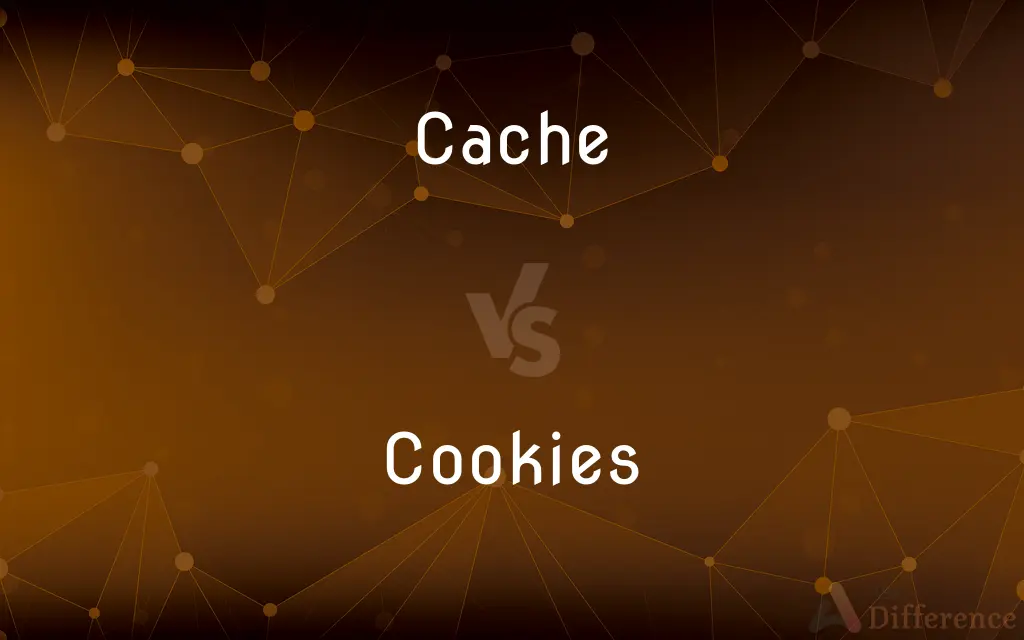Cache vs. Cookies — What's the Difference?
By Maham Liaqat & Urooj Arif — Updated on May 15, 2024
Cache stores copies of web pages, images, and files to speed up website loading, while cookies save user-specific information to personalize web experiences.

Difference Between Cache and Cookies
Table of Contents
ADVERTISEMENT
Key Differences
A cache is used primarily to improve browsing speed by storing web content locally. This allows websites to load faster on subsequent visits because data can be retrieved from the cache rather than being downloaded again. On the other hand, cookies are small files stored on a user's device by websites to remember the user's information or browsing activity, which helps in personalizing the browsing experience according to user preferences or login states.
While cache is focused on the performance aspect of browsing, making content access quicker and more efficient, cookies are designed for functionality, enabling websites to remember user settings, login statuses, and other personalized data across sessions. This difference highlights their distinct roles in enhancing user experience on the internet.
Cached data can include website elements such as HTML files, stylesheets, JavaScript, and multimedia content, which do not typically contain sensitive information. Conversely, cookies often hold more specific data, such as tracking information, user preferences, and session tokens, which can be sensitive.
Users can clear their cache to free up space or resolve loading issues, which might lead to longer loading times temporarily as the cache rebuilds. Clearing cookies, however, can log users out of websites, reset personalized settings, and might necessitate re-entering login information.
From a technical perspective, cache mechanisms can vary from browser cache to gateway cache, designed to serve content faster across different platforms and users. Cookies, while standardized in how they are used across browsers, are crucial for web analytics, targeted advertising, and maintaining user sessions.
ADVERTISEMENT
Comparison Chart
Primary Function
Speeds up page loading by storing web content.
Stores user-specific settings and preferences.
Content Stored
HTML, CSS, JavaScript, images.
User IDs, session tokens, preferences.
Impact on User
Improves performance and load times.
Enables personalized web experiences.
Sensitivity
Generally non-sensitive.
Often contains sensitive information.
User Control
Can be cleared to solve issues or save space.
Clearing affects login states and preferences.
Compare with Definitions
Cache
A tool used by web browsers to store web pages, images, and other content to make pages load faster.
Clearing your browser's cache might fix loading issues.
Cookies
Are subject to privacy laws and user consent.
The website asked for permission to set cookies as required by privacy regulations.
Cache
Serves cached content to speed up access to websites.
The cached version of the website loaded almost immediately.
Cookies
Can be managed through browser settings for privacy.
She adjusted her cookie settings to block third-party trackers.
Cache
Is specific to device and browser.
Cache data on her laptop didn't affect how websites loaded on her phone.
Cookies
Essential for functionalities like shopping carts in online stores.
Cookies kept track of the items in her cart even when she navigated away.
Cache
Helps in reducing bandwidth usage by minimizing the need to download the same files repeatedly.
His data usage decreased after the cache stored frequently visited websites.
Cookies
Small files stored on a user's device by websites to remember information about the user.
Cookies saved his login details, so he didn't have to re-enter them every time.
Cache
Needs periodic clearing to perform optimally.
He cleared the cache monthly to keep his browser running smoothly.
Cookies
Can track browsing activities to provide personalized ads.
After visiting several tech stores online, she noticed the ads became more targeted.
Cache
A collection of items of the same type stored in a hidden or inaccessible place
A cache of gold coins
An arms cache
Cookies
A small, usually flat and crisp cake made from sweetened dough.
Cache
Store away in hiding or for future use
He decided that they must cache their weapons
Cookies
(Slang) A person, usually of a specified kind
A lawyer who was a tough cookie.
Cache
An amount of goods or valuables, especially when kept in a concealed or hard-to-reach place
Maintained a cache of food in case of emergencies.
Cookies
(Computers) A collection of information, usually including a username and the current date and time, stored on the local computer of a person using the World Wide Web, used chiefly by websites to identify users who have previously registered or visited the site.
Cache
The concealed or hard-to-reach place used for storing a cache.
Cookies
Variant of cookie.
Cache
A fast storage buffer in the central processing unit of a computer. Also called cache memory.
Cookies
Plural of cookie
Cache
To hide or store in a cache. ]
Cookies
(dated) cooky
Cache
A store of things that may be required in the future, which can be retrieved rapidly, protected or hidden in some way.
Members of the 29-man Discovery team laid down food caches to allow the polar team to travel light, hopping from food cache to food cache on their return journey.
Cache
(computing) A fast temporary storage where recently or frequently used information is stored to avoid having to reload it from a slower storage medium.
Cache
(geocaching) A container containing treasure in a global treasure-hunt game.
Cache
(transitive) To place in a cache.
Cache
To store data in a cache.
Cache
A hole in the ground, or other hiding place, for concealing and preserving provisions which it is inconvenient to carry.
Cache
That which is hidden in a cache{2}; a hoard; a stockpile.
Cache
A form of memory in a computer which has a faster access time than most of main memory, and is usually used to store the most frequently accessed data in main memory during execution of a program.
Cache
To store in a cache{1}.
Cache
A hidden storage space (for money or provisions or weapons)
Cache
A secret store of valuables or money
Cache
(computer science) RAM memory that is set aside as a specialized buffer storage that is continually updated; used to optimize data transfers between system elements with different characteristics
Cache
Save up as for future use
Common Curiosities
Can cache affect my privacy?
Cache generally does not contain sensitive personal information, so it has minimal impact on privacy.
What is a cache?
A cache is a storage location that browsers and other applications use to save temporary files to speed up loading.
How can I manage my cookies for more privacy?
Most browsers offer settings to manage cookies, allowing you to block or delete them based on your preferences.
Why are cookies important?
Cookies are crucial for personalizing web experiences, maintaining user sessions, and providing targeted advertising.
What are cookies?
Cookies are small files stored on your device by websites to remember information about your browsing or login details.
What happens when I clear my cache?
Clearing your cache can delete stored data, potentially slowing down browsing as the data needs to be downloaded again.
How does cache work?
Cache stores copies of web elements like HTML pages and images which are retrieved faster than downloading from the web.
Why is cache important?
Cache speeds up web browsing by storing parts of websites so they load faster on future visits.
Can cookies affect my privacy?
Yes, cookies can store sensitive information and track your browsing habits, which can impact privacy.
How do cache and cookies work together?
While cache speeds up the loading of web content, cookies personalize the browsing experience, working together to enhance usability and efficiency.
What happens when I clear my cookies?
Clearing cookies can log you out of websites, reset saved settings, and might require re-entering login information.
Are cookies the same as spyware?
No, cookies are not spyware. They are used to store information to improve user experience, though they can be misused for tracking.
What is the legal regulation around cookies?
Many regions require websites to obtain user consent before storing cookies, especially those used for tracking.
How do I enable or disable cookies?
Cookie settings can be managed via your browser’s privacy settings, allowing you to enable or disable them as needed.
Should I clear my cache or cookies regularly?
Regularly clearing cache and cookies can help manage storage and maintain privacy.
Share Your Discovery

Previous Comparison
Diagram vs. Schema
Next Comparison
Dictionary vs. VocabularyAuthor Spotlight
Written by
Maham LiaqatCo-written by
Urooj ArifUrooj is a skilled content writer at Ask Difference, known for her exceptional ability to simplify complex topics into engaging and informative content. With a passion for research and a flair for clear, concise writing, she consistently delivers articles that resonate with our diverse audience.














































